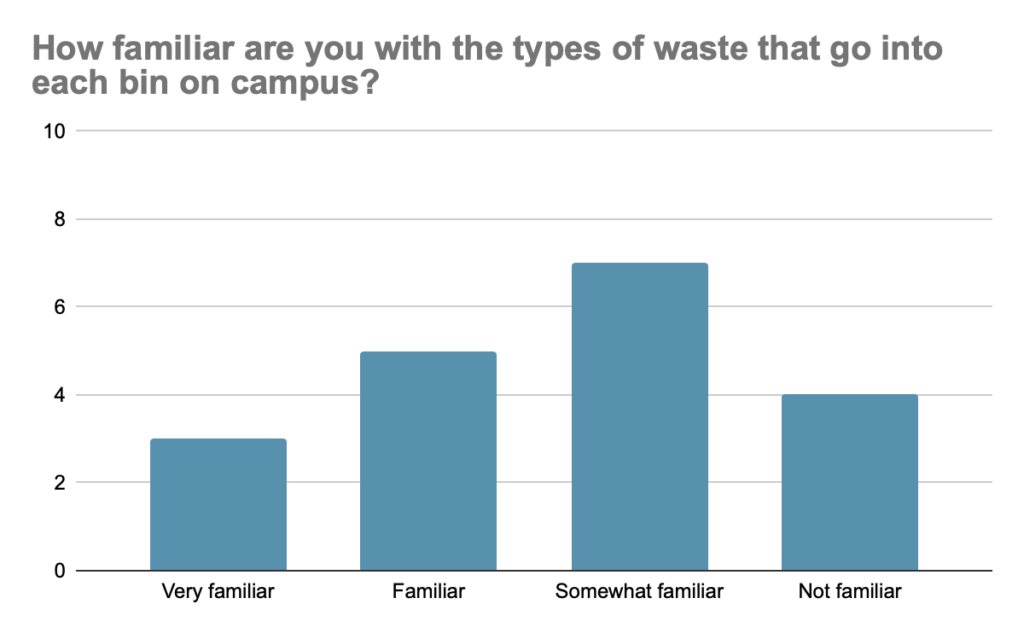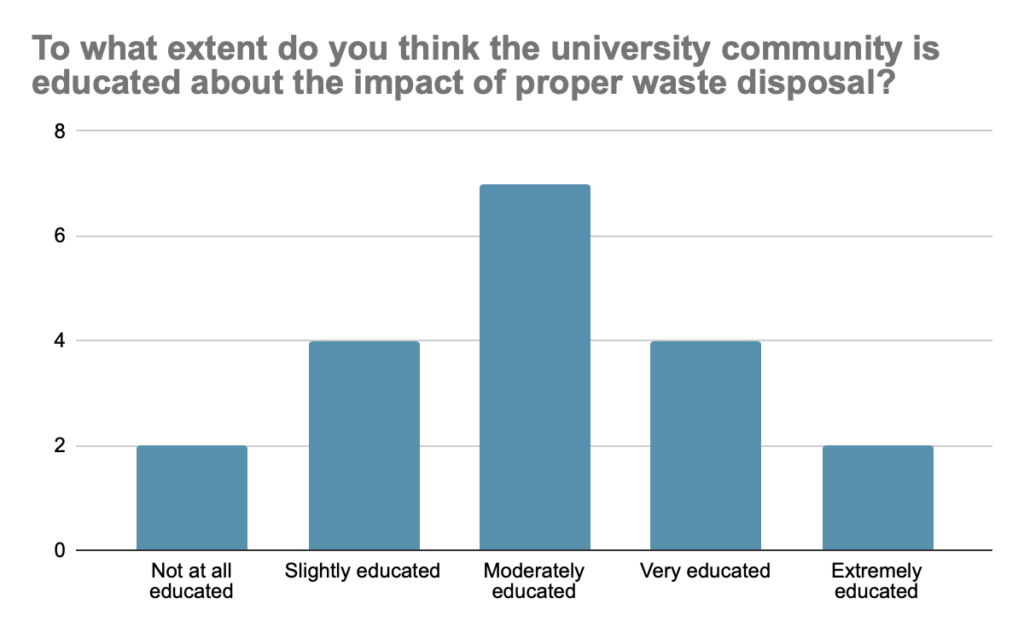Emily Wright, American University
Cite as: Wright, Emily. 2025. “Students’ Recycling Savvy”. Food-Fueled, 2, e00019. https://doi.org/10.57912/28908854.
Web address: https://edspace.american.edu/foodfueled/issues/volume-2/students-recycling-savvy/
Please click here to download the piece as a PDF. The text is also listed below.
Purpose
This research project assesses American University students’ knowledge and comprehension of properly categorizing items into the three waste bins on campus: trash, mixed recycling, and organic waste. Specifically, the study evaluates students’ understanding of appropriate waste disposal within the university’s designated bins. The research interest originates from discussions in the Food for Thought class that explored the importance of food waste management and various composting methods, emphasizing reduction and recycling over disposal. A strong commitment to campus sustainability drives this study, recognizing the collective power of students in fostering meaningful environmental change within the university community. This research question highlights the necessity of education and awareness in proper waste management. A lack of knowledge in this area may indicate the need for educational initiatives promoting responsible waste disposal practices. American University upholds a zero-waste initiative, including food waste recovery and composting efforts. This study aims to provide insight into students’ understanding of the waste bins encountered daily on campus.
Introduction
A study by M Afzal et al. found that “2.6 billion people or 39 percent of the world population do not use proper methods for waste disposal” (2018). This alarming statistic highlights the need to address waste disposal practices across all sectors, including college campuses. As hubs for learning and awareness, universities play a crucial role in shaping students’ understanding of sustainability. However, instances of improper waste disposal among students suggest a gap in their knowledge of sustainable practices. A case study from the Bucharest Academy of Economic Studies revealed that “students are generally aware of waste problems” and “are generally concerned about the environment, natural resources, and waste management” (Tartiui 2011). Such findings are promising, as students make daily choices that influence the environment, and their actions today can shape future waste management efforts. Educating students at a younger age fosters long-term change, improving waste disposal habits both on campus and in their communities. Research by Campos et al. demonstrated that a simple awareness campaign in a university canteen successfully reduced avoidable food waste. The study emphasized that “simple strategies may be useful to improve behaviors and increase the sustainability of the canteens at Universities, although this proved to be only efficient with the collaboration of the canteen staff that needs solid education” (Campos et al. 2018).
Research Question
This research project aims to assess how well American University students know the proper disposal of items in the designated waste bins on campus.
Data Collection
To assess American University students’ knowledge of proper waste disposal, observations were conducted at Freshens, a popular dining spot on campus offering smoothies, salads, and wraps. Freshens attracts a high volume of students throughout the day. On November 15th, 2023, from 2:30 pm to 3:00 pm, a thirty-minute observation took place to analyze how students discard their waste. Additionally, a Google survey was distributed to nineteen American University students, including classmates from the Food for Thought course and other peers. Waste disposal behavior was also recorded by tallying which of the three designated bins were used by twenty-two observed students. The target audience for both studies consisted of full-time undergraduate students at American University.
A tally mark was made for every time a student put items into these bins at Freshens:
- Trash (landfill)
- Mixed recycling
- Organic waste (compost)
The Google survey questions asked are:
- How often do you encounter confusion regarding which waste bin to use for specific items on campus? (Likert scale)
- Responses were in the form of Very frequently, Frequently, Occasionally, Rarely, Never
- How familiar are you with the types of waste that goes into each bin on campus? (Likert scale)
- Responses were in the form of Agree, Somewhat agree, Neither agree or disagree, Somewhat disagree, Disagree
- To what extent do you think the university community is educated about the impact of proper waste disposal? (Likert scale)
- Responses were in the form of Not at all educated, Slightly educated, Moderately educated, Very educated, Extremely educated
Findings
Theme #1: Google Survey
The Google survey conducted on nineteen students reveals that a significant portion of these students lack a clear understanding of the designated purposes for each waste bin on campus. Fifteen students need clarification regarding which waste bin to use for which items occasionally or frequently. This highlights a notable gap in knowledge concerning proper waste sorting practices and suggests a need for educational interventions to enhance students’ understanding of sustainable waste disposal practices. Only two out of the nineteen students believe that the university community is educated about the impact of proper waste disposal. This perception suggests an overarching belief that there is a lack of knowledge within the university community when it comes to discarding waste responsibly.



Theme #2: Observations
Observations at Freshens:
- 13 students discarded their items using the trash (landfill) bin.
- 5 students discarded their items using the mixed recycling.
- 4 students discarded their items using the organic waste (compost) bin.
Out of the twenty-two students observed, a substantial portion, specifically thirteen students, opted to discard their items in the trash bin. In contrast, only five students chose the mixed recycling bin, and a mere four students utilized the organic waste bin. This data is crucial for several reasons. This sheds light on the predominant waste disposal behavior among students on campus. Thirteen students opted for the landfill bin indicating a potential lack of awareness or understanding of the distinction. The significance of this observation becomes apparent when considering the university’s commitment to sustainability and zero-waste initiatives. Proper waste disposal aligns with these initiatives and contributes to a more environmentally friendly campus.

Implications
A Google survey and observations at Freshens among American University students indicate widespread challenges in understanding proper waste disposal, with many defaulting to the landfill bin. This highlights a pressing need for targeted efforts to improve education and awareness on campus. Addressing this issue presents an opportunity to advocate for educational programs that clearly differentiate between trash, mixed recycling, and organic waste bins across campus. Effective communication is essential in promoting sustainable waste practices. In response to these challenges, collaborative initiatives such as educational workshops and awareness campaigns can be developed and implemented. Establishing mechanisms for continuous community feedback will further support a culture of informed and responsible waste disposal at American University.
Conclusion
The research project evaluated American University students’ knowledge of waste disposal practices, specifically their ability to categorize items into the three campus bins: trash, mixed recycling, and organic waste. A Google survey conducted with nineteen students revealed significant confusion, with fifteen uncertain about the correct bin for various items. This finding underscores the need for educational interventions to improve sustainable waste disposal. Observations of twenty-two students further reinforced this issue, as thirteen primarily disposed of items in the trash bin, suggesting a potential lack of awareness. These results highlight the importance of educational initiatives in promoting responsible waste disposal practices, aligning with the university’s sustainability goals. A key takeaway from the research is the critical need to enhance awareness and education on proper waste management among American University students.
References
Cámpos, Suzana Santos, Cláudia Marques-dos-Santos Cardovil, Felipe Fochat Silva Melo, Renata Soares Pinto, and Renata Machado dos Santos Pinto. 2018. “A Simple Awareness Campaign to Promote Food Waste Reduction in a University Canteen.” Waste Management, 76: 28-38. https://doi.org/10.1016/j.wasman.2018.02.044. https://www.sciencedirect.com/science/article/pii/S0956053X18301107.
Afzal, Muhammad, Syed Amira Gilani, Muhammad Hussain, Ambrin Shahzadi. 2018. “Determination of the Level of Knowledge, Attitude, and Practices Regarding Household Waste Disposal among People in Rural Community of Lahore….” International Journal of Social Sciences and Management 5 (3): 219-224. http://dx.doi.org/10.3126/ijssm.v5i3.20614.
Tartiui, Valentina Elena. 2011. “Evaluation of Attitudes & Knowledge Regarding Municipal Waste Among Students. Case study: Bucharest Academy of Economic Studies.” RePEc. https://www.researchgate.net/publication/227490105_Evaluation_of_Attitudes_Knowledge_Regarding_Municipal_Waste_among_Students_Case_study_Bucharest_Academy_of_Economic_Studies.
